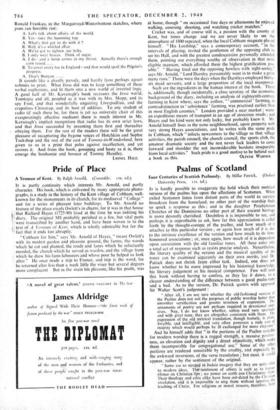Pride of Place
A Yeoman of Kent. Ry Ralph Arnold. (Constable. I 2/1. 6d.) Ir is partly continuity which interests Mr. Arnold, and partly character. His book, which is enlivened by many appropriate photo- graphs, is a study in the history of the Kent village of Cobham, well- known for the monuments in its church, for its mediaeval " College " and for a series of pleasant later buildings. To Mr. Arnold no feature of the place excels Owlett's in charm, for it was in that house that Richard Hayes (1725-90) lived at the time he was inditing his
r diary. The original MS probably perished in a fire, but vital parts were transcribed by another hand, and have been woven in to the 4; text of A Yeoman of Kent, which is wholly admirable but for the iliact that it ends too abruptly.
"Cobham for him," says Mr. Arnold of Hayes, " meant Owlett's with its modest garden and pleasure ground,, the farms, the woods which he cut and planted, the roads and lanes which he reluctantly mended, the church which he served as warden, and the village from which he drew his farm labourers and whose poor he helped to look after." He once made a trip to France, and trip is the word, for he returned after less than a week little the wiser but several degrees more complacent But in the main his pleasure, like his profit, was at home, though " on occasional free days or afternoons he enjoyed walking, coursing. shooting, and watching cricket matches."
Cricket was, and of course still is, a passion with the county of Kent, but times change and we are never likely to see the atmosphere of 1800 repeated, when the local Cobham magnate played himself. " His Lordship," says a contemporary account, " in the intervals of playing, invited the gentlemen of the opposing club to see his Hall, and with the greatest condescension personally attended them, pointing out everything worthy of observation in that most eligible mansion, which afforded them the highest gratification pos- sible." " Having tired out the opposing bowlers with sight-seeing," says Mr. Arnold, " Lord Darnley presumably went in to make a great many runs." Those were the days when the Darnleys employed thirty. six maid servants, and a large proportion of the local manpower. Such are the ingredients in the human interest of the book. There is, additionally though incidentally, a close scrutiny of the economic background of the diary, including an analysis of eighteenth-century farming in Kent where, says the author, "' commercial' farming, in contradistinction to subsistence ' farming, was practised earlier than in most English counties." London provided a near market ; water an expeditious means of transport in an age of atrocious roads ; and Hayes and his kind were not only lucky, but probably knew it. Mr. Arnold himself lives in the same neighbourhood, upon property with very strong Hayes associations, and he writes with the same pride in Cobham, which " infects newcomers to the village so that village activities, the parish council, the church council, the sports club, the amateur dramatic society and the rest never lack leaders to come forward and shoulder the not inconsiderable burdens inseparable from local activities." Such pride is a good motive to be behind such


































 Previous page
Previous page